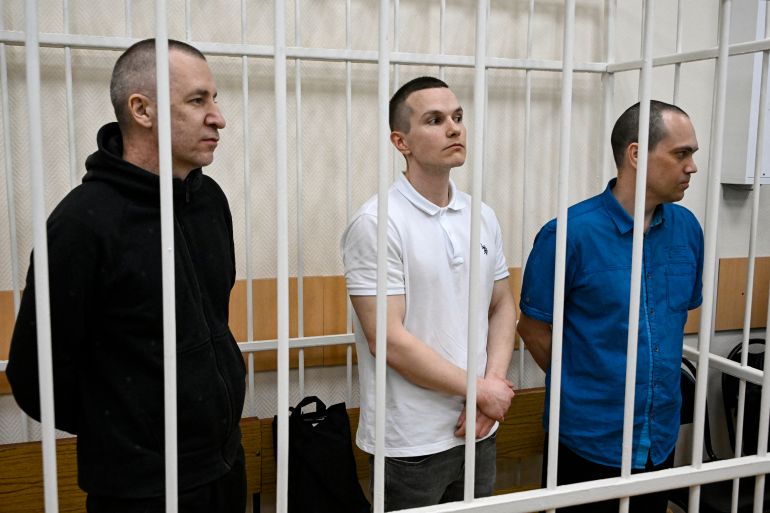Russia puts late opposition leader Alexey Navalny’s lawyers on trial
Vadim Kobzev, Igor Sergunin and Alexei Liptser face up to six years in prison over ‘extremism’ charges.
The three lawyers who used to represent Alexey Navalny: Igor Sergunin, Alexei Liptser and Vadim Kobzev (L-R) in the defendants’ cage [Alexander Nemenov/AFP]Published On 12 Sep 202412 Sep 2024
Three lawyers, who once represented the late Russian opposition leader Alexey Navalny, have gone on trial in Russia over “extremism” charges.
Vadim Kobzev, Igor Sergunin and Alexei Liptser were seen standing in a metal cage for defendants at a district court just east of Moscow on Thursday before Judge Yulia Shilova granted the prosecution’s request to move the session behind closed doors.
The trio, who face a maximum of six years in prison, were arrested in October last year and have been in pre-trial detention since. In November, they were added to Russia’s list of “terrorists and extremists”.
Investigators say they passed messages between imprisoned Navalny and his associates in the outside world, helping the outspoken Kremlin critic continue his outlawed political activity from behind bars.
At the time, Navalny’s team alleged the arrest of the lawyers was an attempt to isolate the politician and anticorruption activist even further in prison, where he spent most of the time in solitary confinement.
At a pre-trial hearing, Sergunin pleaded guilty, independent media reported, while Kobzev and Liptser rejected the charges.
Navalny’s death
In February, Navalny, 47, died in unclear circumstances in an Arctic prison colony, where he was serving a 19-year sentence for leading an “extremist” organisation.
The Kremlin has rejected accusations of Navalny’s allies that President Vladimir Putin ordered him killed in jail.
The West and Moscow were in talks about freeing Navalny in a prisoner exchange before his sudden death.
Since his death, Russian authorities have escalated a campaign against the opposition leader’s backers, allies and family – arresting journalists who covered his court hearings and adding his wife, Yulia Navalnaya, to a “terrorists and extremists” blacklist.
More than 10 years of opposing the Kremlin, the charismatic opposition leader drew tens of thousands to antigovernment street demonstrations.
He nearly died in 2020 after being poisoned on a campaign trip to Siberia ahead of regional elections.
An investigation by Navalny’s team, Western and Russian media outlets connected the assassination attempt to Russian security agents.
Most of his former allies, including Navalnaya who has pledged to continue his work, live in exile.
